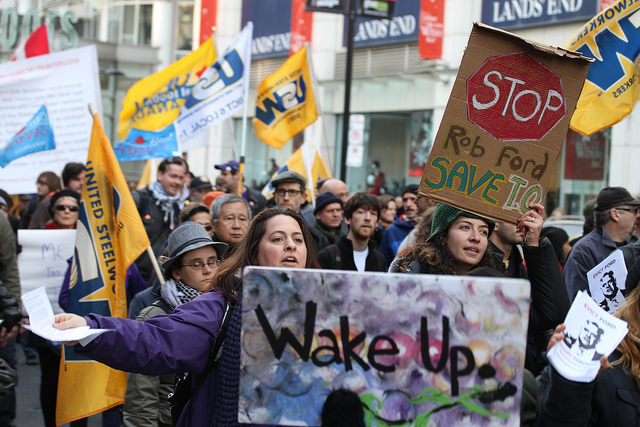Does Mayor Rob Ford have a problem with women? Toronto women don’t need fixing, but the Mayor certainly does.
Over the last several months, the Mayor would have us believe that every slip of the tongue was the result of inebriation. Human mistakes to be forgiven with every apology, and we go back to politics as usual. Were it not for the ongoing mayoralty race, the most recent video may have simply been more fodder for the late night political pundits, with no credible change to the structures which enable sexism in our public institutions. Which begs the question, in an election year, what next for Toronto?
We are right to denounce the Mayor’s sexist, racist and homophobic words. But the matter is not simply about sexist remarks. Actions speak louder than words. This is a Mayor who removed the only female member of the Executive Committee of City Council after he lost support in the early days of the video scandal. This is a Mayor who regularly gets police visits for domestic violence calls. And this is a Mayor who has cut funding to social programs and consistently votes against funding for programs that benefit women. For example, this year alone the Mayor voted against measures to support the expansion of affordable social housing and the emergency shelter system in Toronto’s 2014 budget.
These are not isolated aspects of his character. With such a record, sexism and misogyny are no surprise. They’re served up right alongside the gravy train.
We should be concerned about Toronto’s reputation and leadership that is ineffective and downright disrespectful. But we should also ask ourselves what will replace it. This question is more important than asking whether women will continue to support Rob Ford.
It was disappointing that in responding to the video scandal and the Mayor’s sexist remarks, none of the mayoralty candidates pointed to the broader relationship between recent events and the ill-treatment of women in Toronto’s social policy. The existing Executive Committee has no women and there are only 5 City Councillors who are from visible minorities, out of a total of 44. In other words, more than half of the population of Toronto has neither a voice nor a face in the City’s main policy forum. Furthermore, most proposals for programs that serve women face an uphill battle for their very existence from the get-go, let alone for continued funding.
The gross lack of representation in Canada’s largest and most diverse city is pitiful.
The need for adequate and effective representation is supported by research. Women in public office strongly pursue change in policy agendas, are more likely to consult with residents, and are more likely to be responsive to groups previously denied full access to the policy making process.
And how are responsive policy, the removal of Rob Ford and the removal of sexism in our political institutions linked?
Women in Toronto are not simply numbers in an electorate. Neither are they just beings to be pacified by leaders who continuously issue empty apologies. But leadership that refrains from sexist language while doing little or nothing to meet women’s needs is equally bad.
Consider the woman who gives up recreation for herself because she cannot afford it. The woman who has no driver’s licence and cannot afford the transit fare for her children’s medical appointments. The woman who has been on the waitlist for affordable social housing for almost two decades. They are all real Torontonians. And they all deserve equal consideration in politics.
We need mayoralty candidates, and ultimately a mayor, who will address the links between City Council, social policy and the silencing of the voices of women and other marginalized communities. Yes — sexism, racism and homophobia must be removed from public discourse. But in deciding how to cast our ballot, we need to hear exactly what action will be taken to build a truly equitable city.
Dr. Kara Santokie is the Project Director at Toronto Women’s City Alliance.
Photo: flickr/Danielle Scott



